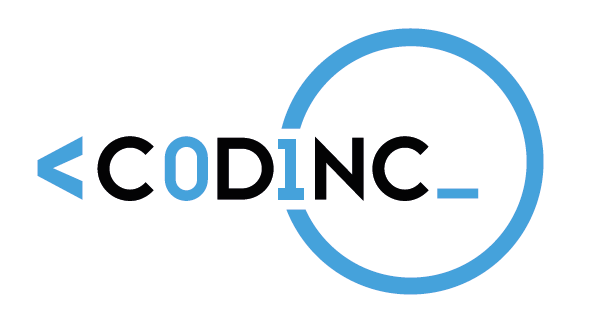Codinc – Coding for Inclusion is the name of the latest two-year project led by ALL DIGITAL. On 8-9 February 2018, partners from Belgium, Spain, Cyprus, Germany and Italy arrived in Brussels to discuss the details of the project.
Purpose of the project
The project aims at fostering STEM education of disadvantaged youth through an inclusive educational approach based on a peer-learning pedagogical method for formal and non-formal educational contexts in Europe. See more below
The project will adapt, disseminate and scale up an inclusive learning good practice based on the Capital Digital project, implemented by project partner and ALL DIGITAL Member Maks in Brussels, Belgium. The Capital Digital methodology and training programme will be adapted to different contexts and will be applied in 5 project partner countries.
Stakeholders
The Codinc stakeholders will be schools, families, civil society organisations, local communities, NGOs, educational institutions and learning providers, training and social inclusion practitioners, public authorities, policy-makers, etc. They will be actively involved in the project, through dissemination, exploitation and evaluation activities.
Productive kick-off meeting
The kick-off meeting started with a Meet & Greet, allowing the partners to chat and get to know each other, which was followed by the presentation of each partner organisation (see the list of partners and representatives below).
Throughout the meeting, many subjects were discussed, with the focus on the work packages and deliverables. In total, there are five work packages (WP). The Management and Dissemination & Exploitation will be led by ALL DIGITAL. MAKS is responsible for Training Kit Adaptation; Colectic will lead the Codinc Experimentation, and Unina from Italy will head the Quality Assurance & Evaluation.
The short-term impact goal is to train at least 24 primary school teachers and 12 secondary school teachers from 5 countries, and to train and involve in peer-learning coding 480 primary school students and 150 secondary school students from 5 countries. Also 1 secondary school class and 4 primary school classes will be involved in each pilot. Altogether, 15,000 people will be reached directly and indirectly through dissemination materials and tools by the end of the project.
Other points of discussion were dissemination and promotional activities and the project branding. Thus, three logo options were presented, and soon you will see the final result.
The hashtag and the URL address for the website chosen as well: #codincEU and codinc.fun respectively.
The next face-to-face meeting with all the partners will take place in July, in Barcelona, Spain.
Project Objectives
The target of this project are primary and secondary school teachers, primary school students (10 to 12 years of age) and secondary school students (15 to 18 years of age), from disadvantaged areas.
1) The main goal is to increase and improve teachers’ and trainers’ capacity to foster the STEM education of disadvantaged youth through an inclusive educational approach based on peer-learning.
2) Another goal is to empower disadvantaged young people in the acquisition and development of IT and collaborative competences as well as problem solving, self-confidence and creativity through a peer-learning training programme on coding.
3) The third goal is to foster the development of a European “Coding for Inclusion” learning community among different actors and across different sectors (formal and non-formal education and training) able to sustain project results and amplify their impact.
Partner organisations and meeting participants:
- ALL DIGITAL, project coordinator – Pia Groenewolt
- Media Action Kureghem City (MAKS vzw), Belgium – Veronique De Leener and Karen Mouws
- eduCentrum vzw (eduC), Belgium – Karen Vos and Hans De Four
- Colectic, Spain – Martina Mayhofer and Felix Casanellas
- Cyprus Computer Society (CCS) , Cyprus – Panicos Mazouras
- 21st Century Competency Centre (21CCC) , Germany – Gerhard Seiler
- University of Naples Federico II (Universita degli Studi di Napoli Federico II (UNINA), Italy – Davide Marocco
- Log in to post comments






